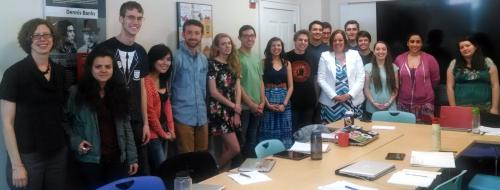Columbia Professor Audra Simpson visits “Settler Colonialism and Indigenous Peoples” Seminar

How does indigenous membership interrupt the stories we think we know about nation-states? How does the recognition of indigenous peoples in Canadian and U.S. law and policy interrupt indigenous family relations, ways of knowing and doing politics, and movement through space? These were among many questions explored on a mid-April Monday afternoon at the Native American Cultural Center, when Yale undergraduates and Visiting Associate Professor of American Studies and YGSNA member Jessica Cattelino enthusiastically welcomed Audra Simpson, Assistant Professor of Anthropology at Columbia University, to their seminar on “Settler Colonialism and Indigenous Peoples.”
In anticipation of Simpson’s visit, students embraced the exciting opportunity to read advance selections from Simpson’s much-anticipated book, Mohawk Interruptus (Duke University Press, 2014). They found the book especially compelling in its ethnographic and theoretical engagement with Mohawk crossings of the US-Canada border and its discussion of gender and law, among other topics. Simpson, a leading scholar in Native Studies and anthropology (and co-editor of the recently-published book Theorizing Native Studies), discussed her book’s ideas while also stepping back to explain the book’s genesis and context in the everyday politics, historical specificity, and personal experiences of Kahnawake Mohawks. Recounting aspects of research in Kahnawake and New York City and explaining how Canadian law that governs Indian membership affected her own and others’ families, Simpson brought the text to life. Students posed questions about the relationship between settler colonialism and U.S. immigration policies, academic publishing and trends in Native Studies, and paths toward justice. We are grateful to Professor Simpson for her intellectual generosity, time and travel, and many insights.
See more here